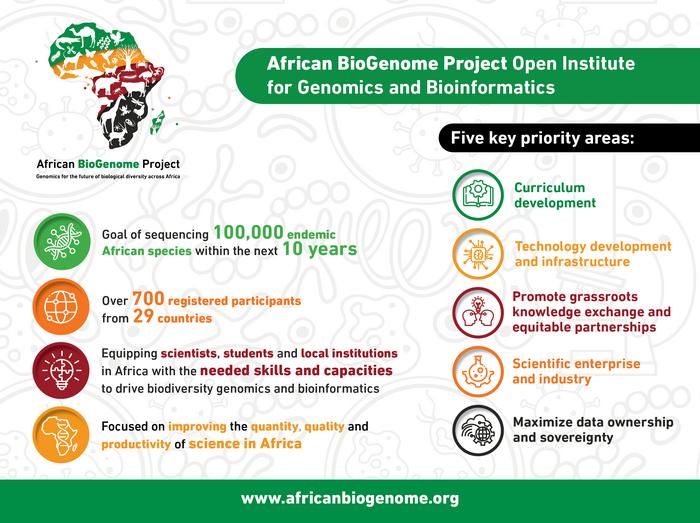Since its inception in 2021, the African BioGenome Project (AfricaBP), has made significant gains towards its ambitious goal of sequencing 100,000 endemic African species within the next 10 years. Recently, AfricaBP reported the successful implementation of the Open Institute in the journal Nature Biotechnology (https://rdcu.be/dlXYT), a pioneering biodiversity genomics and bioinformatics knowledge exchange programme.

Credit: African BioGenome Project
Since its inception in 2021, the African BioGenome Project (AfricaBP), has made significant gains towards its ambitious goal of sequencing 100,000 endemic African species within the next 10 years. Recently, AfricaBP reported the successful implementation of the Open Institute in the journal Nature Biotechnology (https://rdcu.be/dlXYT), a pioneering biodiversity genomics and bioinformatics knowledge exchange programme.
The AfricaBP Open Institute’s framework will establish openly accessible workshops across Africa, crafted in close collaborations with local African Institutions. The primary objective of the Open Institute is to, amongst others, develop biodiversity genomics and bioinformatics curricula and foster grassroots knowledge exchange that revolves around the requirements of African scientists.
Since 2022, the Open Institute has hosted widely-attended workshops in partnership with African institutions and organizations and global partners such as the University of Port Harcourt (Nigeria), Inqaba Biotechnical Industries (South Africa), and the Vertebrate Genome Project (United States) respectively. Over 700 registered participants from 29 countries learned about the cutting-edge technologies shaping the biodiversity and genomics field. The event provided insights into various aspects of genomics and bioinformatics, including understanding current global genomic databases, tools, and resources.
“The high number of applications we are receiving for each workshop shows that there is a need and a hunger for training in bioinformatics and genomics in Africa. The Open Institute seeks to address this by making the workshops and training accessible at almost no cost to the participants”, said Prof. Anne W. T. Muigai, Chair, African BioGenome Project, and Professor at the National Defence University-Kenya, Kenya.
“The African BioGenome Project Open Institute for Genomics and Bioinformatics, a capacity building and knowledge transfer platform is equipping scientists, students and local institutions in Africa with the needed skills and capacity to drive sustainable bioinformatics, data science, genomics research and development. This is our contribution to closing the critical human, infrastructural and technical skills gaps that continue to limit opportunities to leverage innovations in science and technology in Africa”, said Prof. Appolinaire Djikeng, Senior Director, Livestock-Based Systems, CGIAR, Director General, International Livestock Research Institute (ILRI), and Co-Founder of AfricaBP.
The Open Institute of AfricaBP aims to lower some of the barriers that prevent the advancement of biodiversity genomics and bioinformatics knowledge exchange across Africa by focusing on five key priority areas:
- Curriculum development
- Technology development and infrastructure
- Promoting grassroot knowledge exchange and equitable partnerships
- Maximizing data ownership and sovereignty
- Scientific enterprise and industry
Looking to the future of the Open Institute, AfricaBP will broaden outreach to increase representation of participants from across the continent, especially in areas that currently have minimal genomic activity. Attendees of the 2022 events expressed satisfaction with material and content delivery, and had interest in participating in future and upcoming workshops. There are currently five more workshops planned by the end of 2023, including two online and three hybrid workshops.
“One of the major significance of the AfricaBP Open Institute for Genomics and Bioinformatics is its timeliness at a moment when the African Continental Free Trade Area (AfCFTA) agreement is already in effect. Through such a knowledge exchange platform, there is an economic case and justification for organizations, African national science agencies, local and international partners, to support this effort which keeps Africa on the right track for a federated genomic and bioinformatics infrastructure that will contribute to Africa’s bioeconomy”, said Dr. ThankGod Echezona Ebenezer, Founder & Co-Chair, African BioGenome Project, and a Bioinformatician at the University of Cambridge School of Clinical Medicine, UK.
“As the SFA Foundation, we are laser focused on improving the quantity, quality and productivity of science in Africa, which requires a skilled scientific workforce through the development of globally competitive science leaders in Africa. The Open Institute serves our objective of training future generations of scientists who will generate data to inform policy and Africa’s development agenda”, said Prof. Tom Kariuki, Chief Executive Officer, Science for Africa Foundation, Kenya
Over the next 10 years, if the framework and guidance of the AfricaBP Open Institute are successfully implemented, it is estimated that the Open Institute will train at least 200,000 African scientists in genomics and bioinformatics. This will close the infrastructural and technical capacity gap that exists in the biodiversity and genomics space, and build a critical mass of researchers across Africa, moving forward the mission and vision of the African BioGenome Project.
The AfricaBP is an affiliation project partner to the Earth BioGenome Project and the Vertebrate Genomes Project.
Related links:
- Africa: sequence 100,000 species to safeguard biodiversity
- The Next Frontier for African Genomics – Safeguarding African Biodiversity
- Partnership to safeguard African biodiversity through genomics
Fatu Badiane Markey, Ph.D.
Chair, Communication and Public Affairs Subcommittee
African BioGenome Project
Samuel Eziuzor
Co-Chair, Communication and Public Affairs Sub-committee
African BioGenome Project
Chukwuike Ebuzome
Co-Chair, Communication and Public Affairs Sub-committee
African BioGenome Project
Journal
Nature Biotechnology
Method of Research
News article
Subject of Research
People
Article Title
Bridging the gap in African biodiversity genomics and bioinformatics
Article Publication Date
12-Sep-2023
COI Statement
A.M. is an employee of Inqaba Biotechnical Industries (Pty) Ltd. J.E.I. is an employee of AbbVie.




